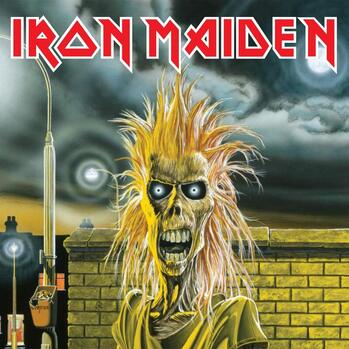 Written by: Sabrina TVBand It’s about time I put my cards on the table; I’m not a big fan of Bruce Dickinson. I have an appreciation for many Dickinson Iron Maiden songs, but like Klaus Meine I find that Dickinson has a voice that becomes grating after a few minutes. He also has an aggressive and very British nerdy goofball energy. I realize I’m mostly alone in having this opinion, but I stand by it. The Di’Anno years of Iron Maiden have been overshadowed by the subsequent Dickinson years in a big way, but Iron Maiden’s self-titled debut is still one of their stronger albums. Di’Anno is known for being a more limited vocalist than Dickinson, but within that limited range I find his voice to be a lot more enjoyable. Later Iron Maiden albums would be defined by suites, epics, and songs at least six minutes long. This debut is punchier and faster all around. Songs like "Prowler," "Running Free," and "Sanctuary" are short, riffy, and even hooky pieces of work. "Prowler" is an incredible opener, with an iconic wah riff. "Running Free" and "Sanctuary" are a great thematic duo, with the former containing one of Di’Anno’s best vocal performances. [Note: "Sanctuary" was included on the US release and subsequent reissues, but not the original album.] Even if Iron Maiden is most defined by its punkier songs, there’s still a fair amount of variety here. "Remember Tomorrow" is a dynamic track with soft sections that crescendo into powerful grooves. "Strange World," unlike "Remember Tomorrow," stays fundamentally soft. Even as some guitar soloing enters the song, it never loses its beautifully phased guitar accompaniment. Both of these songs show that Di’Anno has more versatility as a vocalist than he’s generally given credit for. There’s prog stuff here as well. "Phantom of the Opera" is a complex song filled with several distinct movements. Its 7 minute duration passes quickly. "Transylvania" is a great instrumental that doesn't feel like filler, even if it doesn’t really do anything to evoke the gothic vampire vibe implied by the title. All of these tracks have multiple strong and memorable riffs. Revisiting this album for the first time in a year or two, I was surprised by how I could mentally anticipate large chunks of each song. This is one of those brilliant debuts, like Van Halen, where a band clearly had been compiling great material for years in advance. That isn’t to say everything here is great, though; "Charlotte the Harlot," sole cut written by guitarist Dave Murray, is easily the weakest track. Even if some of the other songs have silly lyrics, none of them are as embarrassing and boyish [in the worst sense of the word] as "Charlotte the Harlot." The closer, "Iron Maiden," is the most reminiscent of Judas Priest / Thin Lizzy stuff, with its harmonizing main guitar riff. It’s a strong closer, and one of the best tracks on the album, worthy of sharing a name with both its album and band. The production of Iron Maiden is solid. Unlike a lot of rock / metal albums from this era, the bass is very audible. The guitars are well defined. The only dated element is the drum sound; the percussion never cuts through the mix quite as well as it should. It also needs to be said that this album is well sequenced; the album paces out its different flavors of material in a way that keeps everything feeling fresh. Iron Maiden is an incredible package. It’s a lot more polished than many other NWOBHM albums released contemporaneously; the musicianship is very tight and the songs are well written. This is one of the great metal debuts, and essential listening. Iron Maiden - Iron Maiden was released April 14th, 1980 by EMI Records (UK) and August 16 , 1980 via Harvest and Capitol Records (US)
1 Comment
Peter
8/22/2023 12:58:44 am
Too bad you don't like Bruce
Reply
Leave a Reply. |
WELCOME!We provide thoughtful reviews of music that wakes us from slumber. Written by a highfalutin peasantry. Archives
July 2024
Categories
All
|
 RSS Feed
RSS Feed